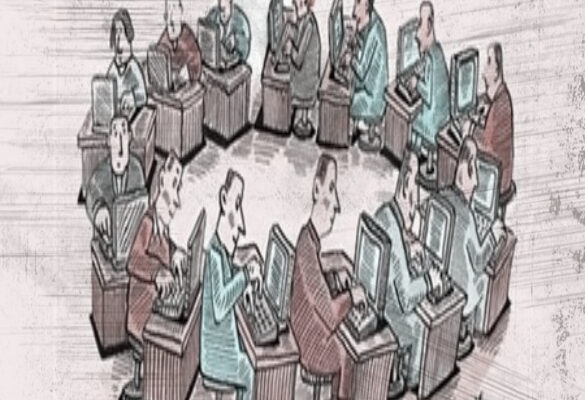In 1941, as World War II still raged, James Burnham, a former Trotskyite, penned one of the best books on political economy produced during the 20th century – The Managerial Revolution. In the book, Burnham attempts to predict what the future of the basic economic structure of society will be. At the time, there were two major theories: (1) capitalism is a permanent part of human society or (2) capitalism will eventually be replaced by socialism, which Burnham defined as a classless, free, and an international society. However, Burnham rejected both of these dominant theories of his time, opting instead for a third theory: that capitalism will be replaced, not by socialism, but rather by a society run by, and for, “managers.”
At the base of Burnham’s theory is his observation that, with the start of World War I, governments around the world began to make far greater intrusions into the economy. By doing this, a new class was, if not outright created, at least greatly strengthened – managers who ran different state organizations now began making major economic decisions (think of the “alphabet soup” entities of the New Deal). Eventually, the power of this managerial class would expand, and they would wrestle societal control from the capitalists, just as the capitalists took societal headship from the aristocracy. It is important to note that Burnham viewed this as a long process; after all, it took the capitalists centuries, from their beginnings in 14th century Italy, to break the power of the nobility, but break it they did. So, while society may be more or less capitalistic now, the managerial revolution was well on its way. Reviewing the major and rising powers of his time, we have the following – National Socialist Germany, Japan, Soviet Russia (as Burnham notes, the classless promises of the communist revolution soon gave way to a society run by managers), and the New Deal United States all, to varying degrees, were/are managerial societies.
Observing our society of today, over 80 years since Burnham wrote his magnum opus, it is stunning just how accurate he ended up. Burnham noted that these managerial organizations would eventually replace parliaments. During the Obama and Biden administrations, it was often noted just how little they accomplished legislatively. Obama had (and still does) Obamacare, but that was accomplished very early in his first term when his party had a filibuster proof majority in the Senate. His legislative accomplishments become very thin after that, and Biden does not fare much better. Despite this, both men were able to preside over a full-scale cultural revolution via regulatory rules and decrees – for example, transgenderism was able to move from the extremely fringe margins to one of the core tenents of the ruling class. Trump was largely unable to accomplish his counter-revolution because he does not understand the power structure of a managerial society.
The managerial revolution can also be observed in the nominally capitalistic elements of American society. For as much as someone like Bernie Sanders rails against CEOs and capitalism, it is important to note that CEOs are not capitalists in the traditional sense, and certainly not in the way Karl Marx meant. Capitalists are traditionally understood as the owners of the means of production, but CEOs are not the owners of the companies they run (typically, unless it is a small business), but rather they’re employees. They are, in fact, managers. Remember, unlike traditional 19th century capitalism, where the business was run by one or two people, the commanding heights of the economy no longer fit this description. Who owns Delta, Facebook, Google, Disney, etc.? Well, no single person. Each of these companies are publicly traded and do not fit what was once understood as capitalist ownership structures. A board of directors made up of the people who own the most stock make the ultimate decisions for the company, but this is a long way from the capitalism of the 19th century. Though the transition from capitalism to managerialism is still ongoing, it is remarkable just how much was accomplished in a single century.
All of this is important because one of the greatest truths in history is “he who rules, makes the rules.” Hence, the rapid social changes of the past century – society is being bended to better suit the managerial class. To understand this, one can look at the most recent social revolution brought on by the managerial elite: widespread transgenderism. Transgenderism requires a massive managerial structure to provide both the consistent treatment they need to feed their delusions and also prohibit others from noticing reality. Because transgenders aid in the managers’ quest for power, they are propped up.
At the time Burnham was writing, he noted that the New Deal United States was the least developed of all the managerial societies. Although he was correct, it is important to understand that, in today’s world, the United States is the most revolutionary. Something important to note about the bureaucracy of both Germany and Japan is that it is/was made up of the old noble classes. As both nations industrialized and sent their peasants to the factories, Germany and Japan had to find some way to keep their aristocracies afloat, which they did by creating government positions for them in a bureaucracy. This meant that their managerial class had some elements of traditional society. But the managerial class of the United States does not share this distinction. Rather, it is drawn from the elements of society that fanatically hate traditional society and, with that, their drive to destroy it is different when compared to the foreign managerial classes.
Southern Nationalists must fight fire with fire. Although we do not control the federal government and have no hope to do so, we can use our remaining leverage in our Southern states to promote our values. State regulatory agencies should be captured and used to promote rightwing, and especially Southern, values. We can already see the great usefulness where this is already being done, in Florida, for example. Other Southern states must follow through. This really is a life-or-death struggle for our people. The managerial revolution is already here. However, what is not set in stone is how the managerial class behaves. It can be, and has been, used for rightwing aims.
Dixie must utilize the managerial state to survive (for the time being), until a more efficient system can be implemented. Leveraging the managerial system, we can eventually create the necessary conditions to finally achieve independence for the South.







Great article Harmonica, Padraig wrote an article awhile back about how Ireland took out the middle management and found victory. The enemies of freedom want the computer to be middle management now, it seems?. My Heart goes out to all those overseas getting swamped by these overseers.
Nice to see you back, God Bless you Sir.
Excellent Harmonica.Surely this bloated and expensive entity will soon collapse.They’ll have nothing to manage.One must keep fighting for the rights only God can give us and hope that He enables our victory.And He may.Till then we must stick to our beliefs and pray it all caves in on itself.God bless you.